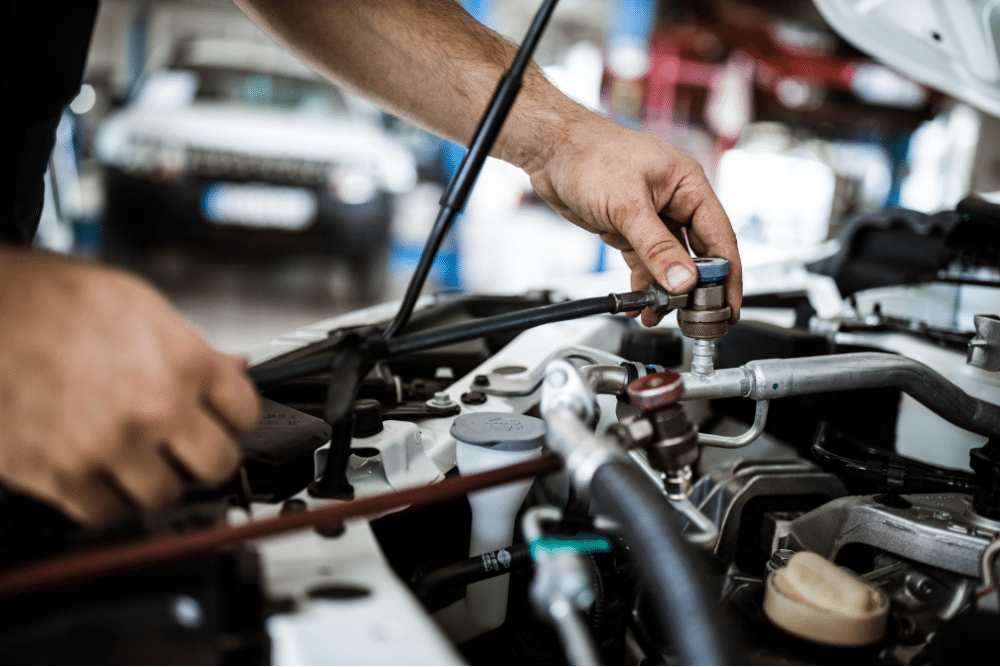You might not think twice about your car’s air conditioning until a service visit leaves you asking, What refrigerant does my car use? With newer vehicles now requiring 1234yf instead of R-134a, and repair costs rising with the switch, many Milwaukee drivers find themselves caught off guard.
What used to be a simple A/C recharge has become a more technical and expensive service. But this change isn’t just about price. It impacts how your system performs, how long it lasts, and how your vehicle complies with modern environmental standards. So why the change? What are the risks of getting it wrong? And how can you make sure your vehicle gets the right service without overpaying?
In this guide, Next Level Auto Services breaks down the shift in refrigerants, the impact on your high-end or daily-driven vehicle, and why choosing a certified local shop is more important than ever for keeping your cool, literally and financially.
What Refrigerant Does My Car Use?
This is one of the most common questions drivers ask when their A/C system starts acting up. The answer largely depends on your vehicle’s age and manufacturer.
- R-134a is found in most vehicles made before 2014.
- 1234yf has become the standard in newer models starting around 2015, especially in brands like Tesla, BMW, Mercedes, Audi, Honda, and Acura.
The shift to 1234yf was driven by global efforts to reduce the environmental impact of automotive refrigerants. It offers a significantly lower Global Warming Potential (GWP) than R-134a, making it the eco-friendly choice now required by manufacturers.
If you’re unsure which your car uses, bring it to our shop in North Milwaukee. We can confirm your system type and ensure you get the correct service, without the guesswork.
R-134a vs. 1234yf: The Key Differences
Here’s how the two refrigerants compare across the board:
Category | R-134a | 1234yf |
Common Use | Vehicles before 2014 | Vehicles 2015 and newer |
Environmental Impact | High (GWP: 1,430) | Very low (GWP <1) |
Cost | Lower | Higher |
System Design | Basic | Sealed and complex |
Availability | Declining | Increasing |
The most important takeaway? While R-134a may still be in circulation, 1234yf is the future—and most modern vehicles require it by law.
1234yf Isn’t Cheap—But Here’s Why It’s Worth It
If you’ve ever gotten a quote for an A/C recharge with 1234yf and done a double-take, you’re not alone. This refrigerant can cost several times more than R-134a—and here’s why:
- Limited production and suppliers in the market
- Higher equipment and handling costs due to strict EPA regulations
- Longer service times because of system complexity
- Specialized technician training is required to service it correctly
Next Level Auto Services invests in the proper tools and certifications to ensure your 1234yf recharge is performed accurately and safely. We never cut corners, and we make sure every dollar you spend reflects long-term value and reliability.
The Risk of DIY A/C Repairs
Modern vehicles using 1234yf are designed with sealed A/C systems, meaning even a small misstep during a recharge can result in serious damage. Overcharging, undercharging, or introducing contaminants may lead to compressor failure or electrical issues.
That’s why we strongly recommend against DIY kits, especially for newer or high-end vehicles. At our shop, we use manufacturer-approved recovery machines and OEM scan tools to ensure your system is evacuated, recharged, and tested to factory specs.
Understanding Environmental Impact
The auto industry’s shift from R-134a to 1234yf wasn’t just for efficiency, it was for the environment. R-134a has a high Global Warming Potential, while 1234yf’s GWP is almost zero.
With climate initiatives growing across Wisconsin and beyond, vehicle manufacturers are aligning with environmentally responsible practices. If you’re driving a newer vehicle, you’re already doing your part. Servicing your A/C with certified shops like Next Level ensures proper refrigerant recovery and recycling, reducing your carbon footprint even further.
Why Milwaukee Drivers Need to Be A/C-Savvy
Milwaukee’s weather isn’t easy on vehicles. From frigid winters to humid summers, your A/C system doesn’t just cool, it defrosts, dehumidifies, and balances your interior climate year-round.
This constant workload means:
- Even a small leak can significantly reduce performance.
- Routine A/C checkups are critical before the heat of summer or the deep cold of winter.
- Refrigerant loss, no matter how minor, can eventually lead to bigger issues, especially with 1234yf systems.
Our team recommends a preventative A/C inspection every spring, particularly if you drive a newer model or high-end vehicle.
Precision, People, and Performance—The Next Level Standard
Our Milwaukee shop is more than just a place to fix your car, it’s where modern technology meets integrity-driven service. Here’s what sets us apart when it comes to A/C repairs and recharges:
Certified Technicians
Our founder, Ryan Witte, is an ASE Master Technician with additional Master Tech certifications for Honda, Acura, BMW, and advanced diagnostics. That experience ensures your vehicle gets factory-level expertise, every time.
High-End Equipment
From OEM scan tools to 1234yf-compatible recovery systems, our shop is fully equipped for modern A/C systems, including electric and hybrid vehicles like Tesla.
Customer-Focused Service
We don’t just repair, we educate. We explain what we’re doing, why it matters, and how it helps your vehicle last longer. Our waiting area is clean and comfortable, with contactless drop-off, text-to-pay, and a 3-year/36,000-mile warranty backing our work.
Specialty Vehicles Welcome
We focus on brands that require precision—Tesla, BMW, Audi, Honda, Acura, Mercedes—but we also service domestic and Asian vehicles under 20 years old.
When you’re searching for “Auto A/C services nearby” or “1234yf A/C recharge near me,” we want to be your first call, and your last stop.
Beyond the Label: Understanding Vehicle-Specific A/C Needs
Not all A/C systems are created equal. Two cars may both use 1234yf, but their systems might differ drastically in pressure specs, control modules, and even the tools needed to access key components.
That’s why we approach each A/C service with vehicle-specific diagnostics, not one-size-fits-all solutions. Our technicians check for leaks, assess system efficiency, and monitor compressor function using data directly from your vehicle’s onboard diagnostics system.
This ensures your system isn’t just recharged, it’s optimized for performance, safety, and longevity.
Frequently Asked Questions
How do I know if my A/C system has a leak?
A drop in cooling performance, unusual hissing sounds, visible residue around fittings, or a sudden foggy windshield during defrost mode may indicate a refrigerant leak. At Next Level Auto Services, we perform dye tests and electronic leak detection to identify even the smallest leaks in both 1234yf and R-134a systems.
Why does my A/C always seem to fail when it gets warm out?
It’s not just your luck—many drivers only notice A/C issues once they finally turn it back on during the first warm days of spring. Over the winter, refrigerant can slowly leak out, or components like the compressor clutch may seize from disuse. Testing your A/C system early gives you time to fix small issues before they become big (and expensive) ones.
Can I retrofit my older R-134a system to use 1234yf?
Technically yes, but it’s rarely recommended. Retrofitting requires component replacements, seal changes, and system flushing to prevent chemical incompatibility. In most cases, the cost and labor outweigh the benefits. Our team can help you determine if it’s worth pursuing or if maintaining your current system is the better choice.
Does 1234yf cool as effectively as R-134a?
Yes. 1234yf offers similar thermal performance to R-134a when used in properly designed systems. While the refrigerant itself is more environmentally friendly, it doesn’t sacrifice cooling power. That said, your vehicle’s performance still depends on system design, charge levels, and component condition—which we thoroughly inspect during service.
Is it safe to use aftermarket refrigerants or A/C sealers?
No. Aftermarket or “universal” refrigerants and sealants can contaminate your A/C system, clog internal components, and void warranties. This is especially dangerous in 1234yf systems, which require highly specific pressure and chemical standards. We only use manufacturer-approved refrigerants and never recommend short-term fixes that risk long-term damage.
Can A/C performance be affected even if refrigerant levels are fine?
Absolutely. Refrigerant is only one part of the equation. Weak airflow, sensor issues, malfunctioning compressors, or cabin air filter clogs can all reduce A/C performance without impacting charge levels. At our shop, we run full system diagnostics to catch what others might miss—ensuring your comfort isn’t compromised.
Book Your Next-Level A/C Service in Milwaukee, WI
A/C issues shouldn’t mean compromise. At Next Level Auto Services, we combine OEM tools, master-certified technicians, and a customer-first approach to bring you unmatched service for both R-134a and 1234yf systems.
Whether you’re in north Milwaukee, Menomonee Falls, or Mequon, we’re right in your neighborhood—ready to serve.
Visit us at:
Next Level Auto Services
9334 N 107th Street,
Milwaukee, WI 53224
Call now: 414-206-0100 or book at nextlevelautoservices.com

